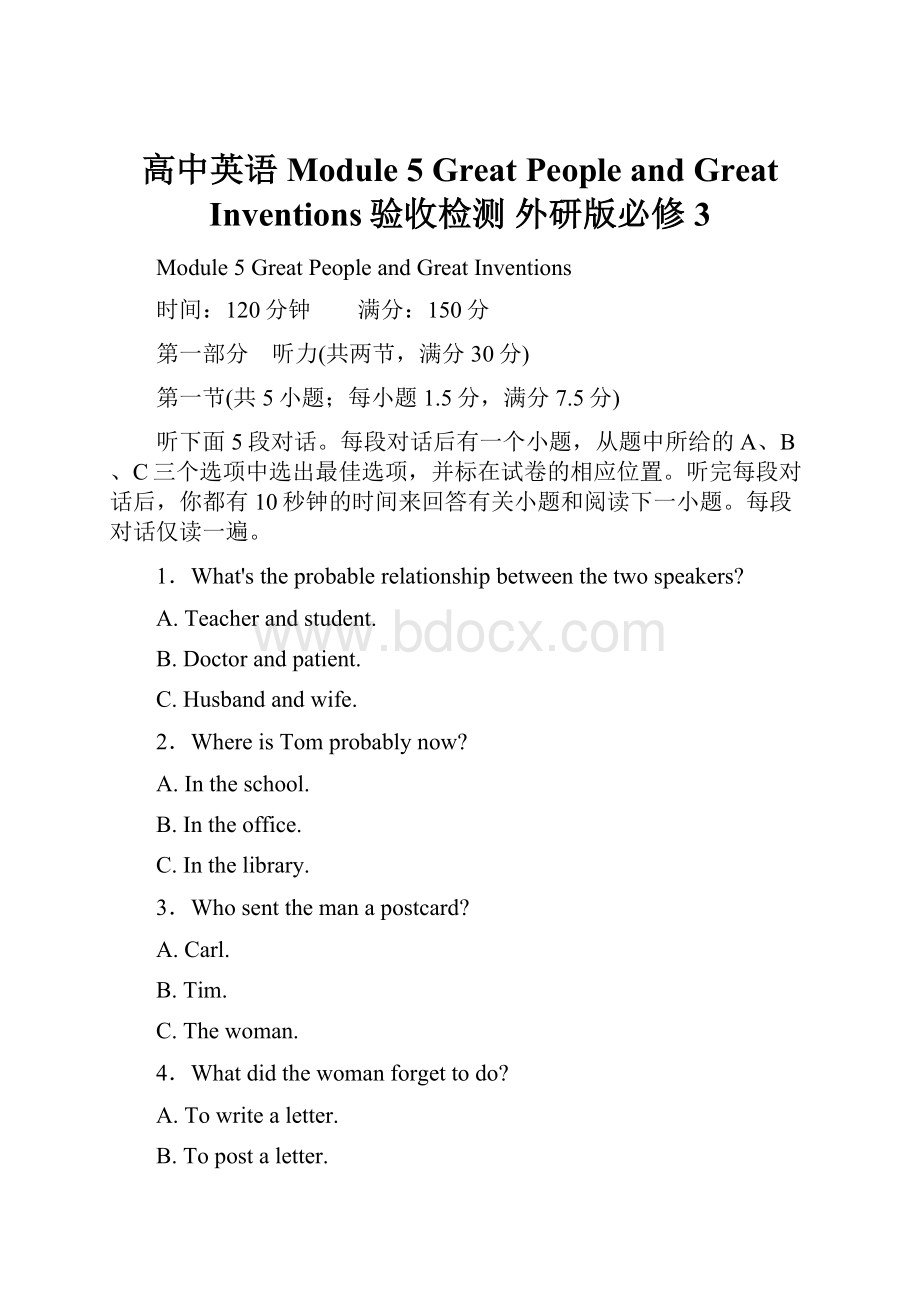高中英语 Module 5 Great People and Great Inventions验收检测 外研版必修3.docx
《高中英语 Module 5 Great People and Great Inventions验收检测 外研版必修3.docx》由会员分享,可在线阅读,更多相关《高中英语 Module 5 Great People and Great Inventions验收检测 外研版必修3.docx(26页珍藏版)》请在冰豆网上搜索。

高中英语Module5GreatPeopleandGreatInventions验收检测外研版必修3
Module5GreatPeopleandGreatInventions
时间:
120分钟 满分:
150分
第一部分 听力(共两节,满分30分)
第一节(共5小题;每小题1.5分,满分7.5分)
听下面5段对话。
每段对话后有一个小题,从题中所给的A、B、C三个选项中选出最佳选项,并标在试卷的相应位置。
听完每段对话后,你都有10秒钟的时间来回答有关小题和阅读下一小题。
每段对话仅读一遍。
1.What'stheprobablerelationshipbetweenthetwospeakers?
A.Teacherandstudent.
B.Doctorandpatient.
C.Husbandandwife.
2.WhereisTomprobablynow?
A.Intheschool.
B.Intheoffice.
C.Inthelibrary.
3.Whosentthemanapostcard?
A.Carl.
B.Tim.
C.Thewoman.
4.Whatdidthewomanforgettodo?
A.Towritealetter.
B.Topostaletter.
C.Towalkpastthepostoffice.
5.Whatisthemangoingtodo?
A.Togoswimming.
B.Togoskating.
C.Tochangehismind.
第二节(共15小题;每小题1.5分,满分22.5分)
听下面5段对话或独白。
每段对话或独白后有几个小题,从题中所给的A、B、C三个选项中选出最佳选项,并标在试卷的相应位置。
听每段对话或独白前,你将有时间阅读各个小题,每小题5秒钟;听完后,各小题将给出5秒钟的作答时间。
每段对话或独白读两遍。
听第6段材料,回答第6至8题。
6.Whatarethemanandthewomantalkingabout?
A.Eatinginarestaurant.
B.Asmallrestaurant.
C.Thehistoryofacompany.
7.HowmanyMcDonald'swerethereintheworldin1982?
A.7063.
B.7603.
C.1283.
8.WhydoworkersbuylunchesinMcDonald's?
A.Theemployeestherearehelpfulandpolite.
B.Thefoodtastesbetterthantheirlunchesfromhome.
C.Thetablesandfloorsareclean.
听第7段材料,回答第9至11题。
9.WhatdoesRogersmeaninthisconversation?
A.Tom'sfriends.
B.Tom'steachers.
C.Thenameofashop.
10.WhatdoesTomtellhismotherinyesterday'sletter?
A.Hehadfoundajob.
B.Hehadlosthisnewjob.
C.Hehadjustboughtacar.
11.Whydidn'tTomtellhismotherabouthisjob?
A.Becausehedidn'twanthertoworryabouthisjob.
B.Becausehedidn'twanthertoworryabouthislife.
C.Becausehedidn'twanthertoworryabouthisstudy.
听第8段材料,回答第12至14题。
12.Whyhasthewomandecidednottoworkattheboy'scamp?
A.Shehasn'tworkedtherebefore.
B.Sheknowslittleaboutthecamp.
C.Shewantstobebetterpaid.
13.WhoonceworkedattheHollywoodHotel?
A.Afriendoftheman's.
B.Theman'ssister.
C.Themanhimself.
14.Whatkindofjobwouldthewomanliketodo?
A.Ajobinaschool.
B.Ajobintheopenair.
C.Ajobatthehotel.
听第9段材料,回答第15至17题。
15.Wheredoestheconversationtakeplace?
A.Ataseafoodrestaurant.
B.Inadininghall.
C.Onthephone.
16.Whatdoweknowabouttherestaurant?
A.Itisfamousforseafood.
B.Itseldomacceptslargeparties.
C.Famouspeopleoftencometoit.
17.Whatcanweknowfromtheconversation?
A.Therestaurantisnearthesea.
B.Seafoodisverypopularnowadays.
C.Regularcustomershaveadvantagesthere.
听第10段材料,回答第18至20题。
18.WhendidGrandmaMosesturntopainting?
A.Attheageof76.
B.Attheageof39.
C.Attheageof101.
19.WhatdidGrandmaMosesdobeforeshebecameanartist?
A.Shesoldotherartists'worksinashop.
B.Sheworkedonherfarm.
C.Shetaughtataschool.
20.Whatisthestorymainlyabout?
A.AfamousAmericanartist.
B.Makingmoneyfrompainting.
C.Collectingpaintings.
听力材料
(Text1)
M:
CanIhelpyou?
W:
Yes,Ican'tsleepwell.
M:
HowcanIhelpyou?
W:
CanyougivemesomemedicinesothatIcanhaveagoodsleep?
(Text2)
M:
Excuseme,I'dliketohaveawordwithTom.
W:
Sorry,heisn'there.He'sgonetothelibrary.
M:
Oh,I'llleavehimamessagethen.
(Text3)
W:
Carlsentmeapostcardyesterday.
M:
I'vegotonefromTimbutnotfromCarl.
W:
Oh,really?
Ihaven'theardfromTimmanymonths.
(Text4)
M:
Didyouremembertoposttheletter?
W:
Well,Irememberwalkingpastthestreet.
M:
Butyouforgottoposttheletter.
W:
I'mafraidso.Ididn'trememberyoutellingmetoposttheletter.
(Text5)
M:
I'mgoingtochangemymindtogoswimmingwithyou.
W:
That'swonderful.
M:
Whenshallwego?
W:
Halfpasttwothisafternoon.
(Text6)
M:
IsittruethatfastfoodrestaurantsareverypopularintheUSA?
W:
Yes,especiallyinbigcities.
M:
Why?
W:
Becausethefoodisgood,theserviceisfastandthepricesarelow.
M:
Oh,that'sgood.Thenwhichrestaurantismostwell-known?
W:
McDonald's.By1982,therewere7063McDonald'sintheworld,andabout1283ofthemwereinothercountries,suchasJapan,WestGermany,EnglandandAustralia.
M:
Isee.Howabouttheserviceandthefood?
W:
Well,theemployeestherearehelpfulandpolite,andthetablesandfloorsareveryclean.Mostimportant,peoplecangetthesamefoodatanyMcDonald'sinanystateofthecountry.Thefood,ofcourse,isquitegood.Frenchfries,thehamburgers,thesandwiches—areallspeciallyprepared.Workersbuytheirlunchestherebecausetheytastebetterthantheirlunchesfromhome.
M:
WhoistheownerofMcDonald's?
W:
Itwasfirstownedbytwobrothers,RichardandMauriceMcDonald.Then,in1960,RayKroc,a56-year-oldsalesman,boughtthenameandmostoftheirrestaurantsfor$2.7million,andnowheistheowner.
(Text7)
W:
Whatareyoudoing,Tom?
M:
I'mwritingtomymother.
W:
Butyouwroteheronlyyesterday.
M:
Yes,butIhavesomethingnewtotellher.
W:
Somethingnew?
M:
Yes.IamtellingherI'vedecidedtotakeupapart-timejobasashopassistant.
W:
Whatdoyoumean?
You'vebeenworkingasonefornearlythreemonths.HaveyoubeenfiredbyRogers?
M:
No.Mymotherdoesn'tknowIhaveapart-timejob.
W:
Youmean,youdidn'ttellherbefore?
M:
No.
W:
Butwhyareyoutellinghernow?
M:
NowIdon'twanthertoworryaboutmylifehere.Yousee,ItoldherthatI'djustboughtacarinmylastletter.
(Text8)
M:
It'salmostvacationtime.Haveyoufoundasummerjobyet?
W:
No,Idon'tthinkIwillworkattheboy'scampwhereIworkedlastsummer.Campjobsdon'tpaymuch.
M:
IthinkIcanfindajobattheHollywoodHotel.Afriendofminewasawaiterlastsummer.Thepaywasn'tgood,butthetipswere.
W:
Mysisterworkedtherelastsummer,makingbedsandcleaningbathrooms.Shedidn'tlikeitbutsheearnedalotofmoney.
M:
Thatsoundsreallygood.
W:
Yes.AndIwantajoboutside.Aftersittingincollegeclassesallwinter,I'dlikeajobintheopenair.
M:
Thehighschoolkidsearnalotofmoneyeverysummercuttinggrass.Mybrotherisonlyfourteen,buthegetsfivedollarseverytimehecutsthegrass,anditonlytakeshimanhour.Hejustridesaroundonthemachinethathebought,andthemachinedoesallthework.
W:
That'sprettygood.IusedtocutgrasswhenIwasinhighschool.ButnowIthinkImightworkforaroad-buildingcompany,ordosomethinglikethat.
M:
Itcouldbeagoodexperience.Andyoucouldearnalot,too.
(Text9)
W:
Hello,AppleTreeRestaurant.CanIhelpyou?
M:
Yes.I'dliketobookatablefortonight.
W:
Yes,sir.Whattime?
M:
Eighto'clock.
W:
Certainly.Forhowmanypeople?
M:
Therearetenofus.
W:
Tenofyou!
Butwedon'tusuallyacceptlargeparties,sir.
M:
Iknow,butweareregularcustomers.
W:
What'syourname,please?
M:
MichaelPeterson.
W:
Mr.Peterson...ofcourse!
That'llbeallright.We'llputtwotablestogether.
M:
Thanks.
W:
Whatfoodwouldyouprefertoday,sir?
Wehavefreshseafoodtonight.
M:
No.Weliketoeatvegetables.
(Text10)
Fewpeoplewouldeventhinkofbeginninganewjobattheageof76,butoneofAmerica'smostfamousartistsdidjustthat.AnnaMaryRobertson,betterknownas“GrandmaMoses”,turnedtopaintingbecauseshewastoooldtoworkonherfarm.
GrandmaMosespaintedcarefullyandherworkswerenice.Shefirstpaintedonlytoenjoyherself,andthenbegantosellherworksforalittlemoney.In1939,acollector,LouisCaldorhappenedtoseeseveralofGrandmaMoses'workshanginginashop.Helikedthem,boughtthematonce,andsetouttolookformore.CaldorheldashowtointroducetheworksofGrandmaMosestootherartists.
GrandmaMosesdiedonDecember13th,1961,attheageof101.Shewasworld-famous.
【答案】 1-5 BCBBA 6-10 CABCC
11-15 BCABC 16-20 BCABA
第二部分 阅读理解(共两节,满分40分)
第一节(共15小题;每小题2分,满分30分)
阅读下列短文,从每题所给的四个选项(A、B、C和D)中,选出最佳选项。
A
PeoplefromEastAsiatendtohavemoredifficultythanthosefromEuropeindistinguishingfacialexpressions—andanewreportpublishedonlineinCurrentBiologyexplainswhy.
RachaelJack,UniversityofGlasgowresearcher,saidthatratherthanscanningevenly(均匀地)acrossafaceasWesternersdo,Easternersfixtheirattentionontheeyes.
“WeshowthatEasternersandWesternerslookatdifferentfacefeaturestoreadfacialexpressions,”Jacksaid.“Westernerslookattheeyesandthemouthinequalmeasure,whereasEasternersfavortheeyesandneglect(忽略)themouth.”
AccordingtoJackandhercolleagues,thediscoveryshowsthathumancommunicationofemotionismorecomplexthanpreviouslybelieved.Asaresult,facialexpressionsthathadbeenconsidereduniversallyrecognizablecannotbeusedtoreliablyconveyemotionsincrossculturalsituations.
Theresearchersstudiedculturaldifferencesintherecognitionoffacialexpressionsbyrecordingtheeyemovementsof13WesternCaucasianand13EastAsianpeoplewhiletheyobservedpicturesofexpressivefacesandputthemintocategories:
happy,sad,surprised,fearful,disgusted,angry,orneutral.Theycomparedhowaccuratelyparticipantsreadthosefacialexpressionsusingtheirparticulareyemovementstrategies.
ItturnedoutthatEasternersfocusedmuchgreaterattentionontheeyesandmadesignificantlymoreerrorsthanWesternersdid.“Theculturaldifferenceineyemovementsthattheyshowisprobablyareflectionofculturaldifferenceinfacialexpressions,”Jacksaid.“OurdatasuggestthatwhereasWesternersusethewholefacetoconveyemotions,Easternersusetheeyesmoreandthemouthless.”
Inshort,thedatashowthatfacialexpressionsarenotuniversalsignalsofhumanemotion.Fromhereon,examininghowculturalfactorshavediversifiedthesebasicsocialskillswillhelpourunderstan